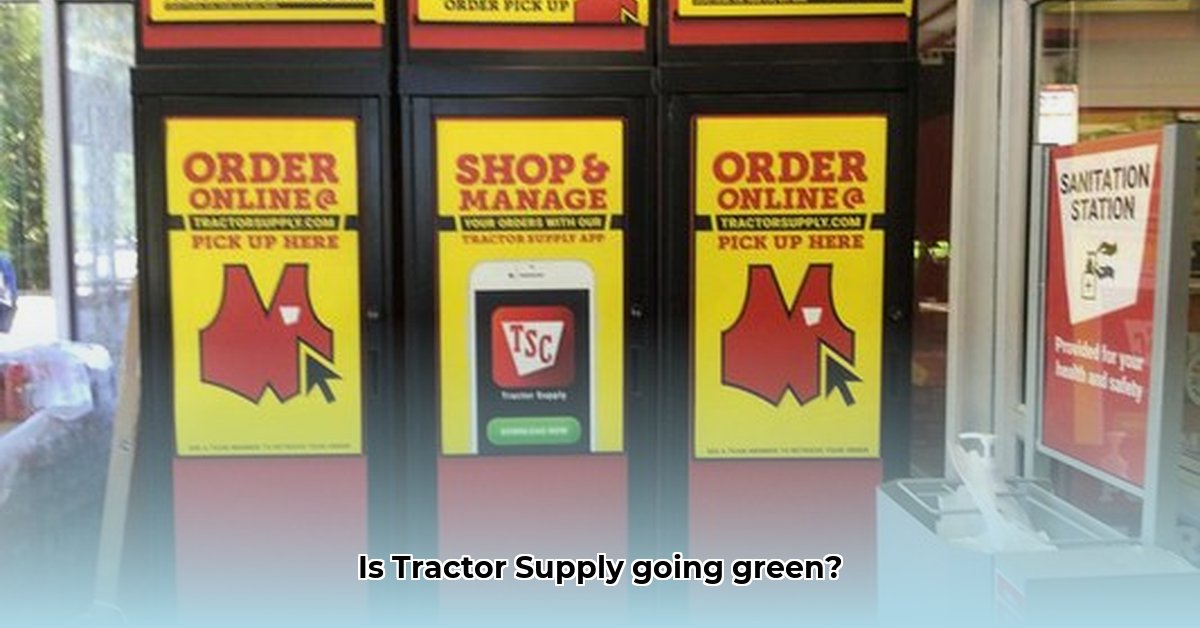
The recent opening of a new Tractor Supply Company (TSC) store in Newnan, Georgia, incorporating PetVet animal care services, prompts an important question: What is the true impact on sustainable agriculture in the region? While increased access to supplies benefits local farmers, a comprehensive analysis reveals both opportunities and significant challenges regarding environmental impact and long-term farm viability. For insights on equipment, check out this guide on tractor sizing.
Easier Access to Supplies: A Boon for Local Farms?
Small, sustainable farms often face logistical hurdles in acquiring essential supplies. The time, fuel costs, and potential stock shortages associated with distant supply sources significantly impact their efficiency and profitability. The Newnan TSC store aims to alleviate these issues by providing convenient local access to agricultural inputs. This increased accessibility could lead to higher crop yields and reduced operational costs, potentially strengthening the local food system. However, this benefit needs to be weighed against other factors. Does the convenience outweigh potential environmental consequences?
PetVet: Improving Animal Health, Enhancing Sustainability
The integration of PetVet animal care services within the Newnan TSC store is a crucial, often overlooked, element of sustainable agriculture. Access to affordable preventative care for farm animals is vital for maintaining herd health and minimizing losses from preventable illnesses and injuries. Healthy livestock translate to improved productivity and reduced reliance on replacement animals, thus contributing to the overall sustainability of the farming operation. But again, consideration must be given to the environmental impact of the veterinary services themselves.
Environmental Impacts: A Lack of Transparency
While increased accessibility presents clear advantages, a critical evaluation of the environmental consequences is necessary. The increased transportation of goods, packaging waste, and energy consumption associated with the new store and its operations represent significant potential environmental drawbacks. However, Tractor Supply Company's transparency regarding these impacts currently falls short. The lack of readily available data on energy usage, waste management, and supply chain logistics hinders a complete assessment of the store's true ecological footprint. This lack of information is a serious concern. Independent research into the environmental effects of similar agricultural supply chains is urgently needed.
What are the real-world emissions attributed to TSC’s operations, and how are they being mitigated? Is there a quantifiable plan to reduce those emissions?
Long-Term Farm Viability: Navigating Complex Challenges
The long-term sustainability of smaller farms in the Newnan area faces multifaceted challenges beyond the simple acquisition of supplies. Climate change, fluctuating market prices, and competition from larger agricultural businesses all pose significant threats to their viability. While the Newnan TSC store might ease access to resources, it does not address these underlying systemic issues. Experts suggest diversification of income streams and enhanced collaboration among farmers as key strategies for resilience. The question remains: Can TSC's contribution genuinely offset these larger pressures?
Actionable Recommendations: A Collaborative Approach
Achieving sustainable agriculture in Newnan demands a collaborative effort involving TSC, local farmers, government agencies, and consumers. The following actionable steps are crucial:
Tractor Supply Company: Publicly release detailed environmental impact reports, including quantifiable data on energy consumption, waste generation, and transportation emissions. Implement robust sustainability initiatives such as the use of sustainable packaging materials and investment in renewable energy sources. Set ambitious, publicly verifiable carbon reduction targets.
Local Farmers: Embrace climate-smart agriculture, explore sustainable farming practices, and adopt resource-efficient techniques. Diversify income streams through value-added products and explore collaborative purchasing or marketing schemes.
Local Government: Provide incentives and support for sustainable agriculture, including investments in sustainable infrastructure and research into climate-resilient farming methods. Develop policies that encourage eco-friendly farming practices.
Consumers: Prioritize purchasing locally sourced, sustainably produced food. Advocate for policies supporting sustainable agriculture and demand greater transparency from retailers regarding their environmental practices.
"The success of this initiative relies on a commitment to transparency and collaboration," says Dr. Amelia Hernandez, Professor of Agricultural Economics at the University of Georgia. "We need open data and a shared understanding of the challenges to make real progress."
Conclusion: A Path Towards Sustainability
The Newnan Tractor Supply expansion, while offering benefits in terms of access and animal care, presents a complex interplay of opportunities and challenges for sustainable agriculture. Addressing the environmental impact, promoting farm viability, and fostering collaboration among all stakeholders are crucial for a successful and sustainable future for farming in the Newnan area. Only through transparency, data-driven decision-making, and a shared commitment to sustainable practices can we hope to create a truly positive outcome.